General, Sir John Monash, Personal Files Book 21, 3 October - 24 November 1918 - Part 14
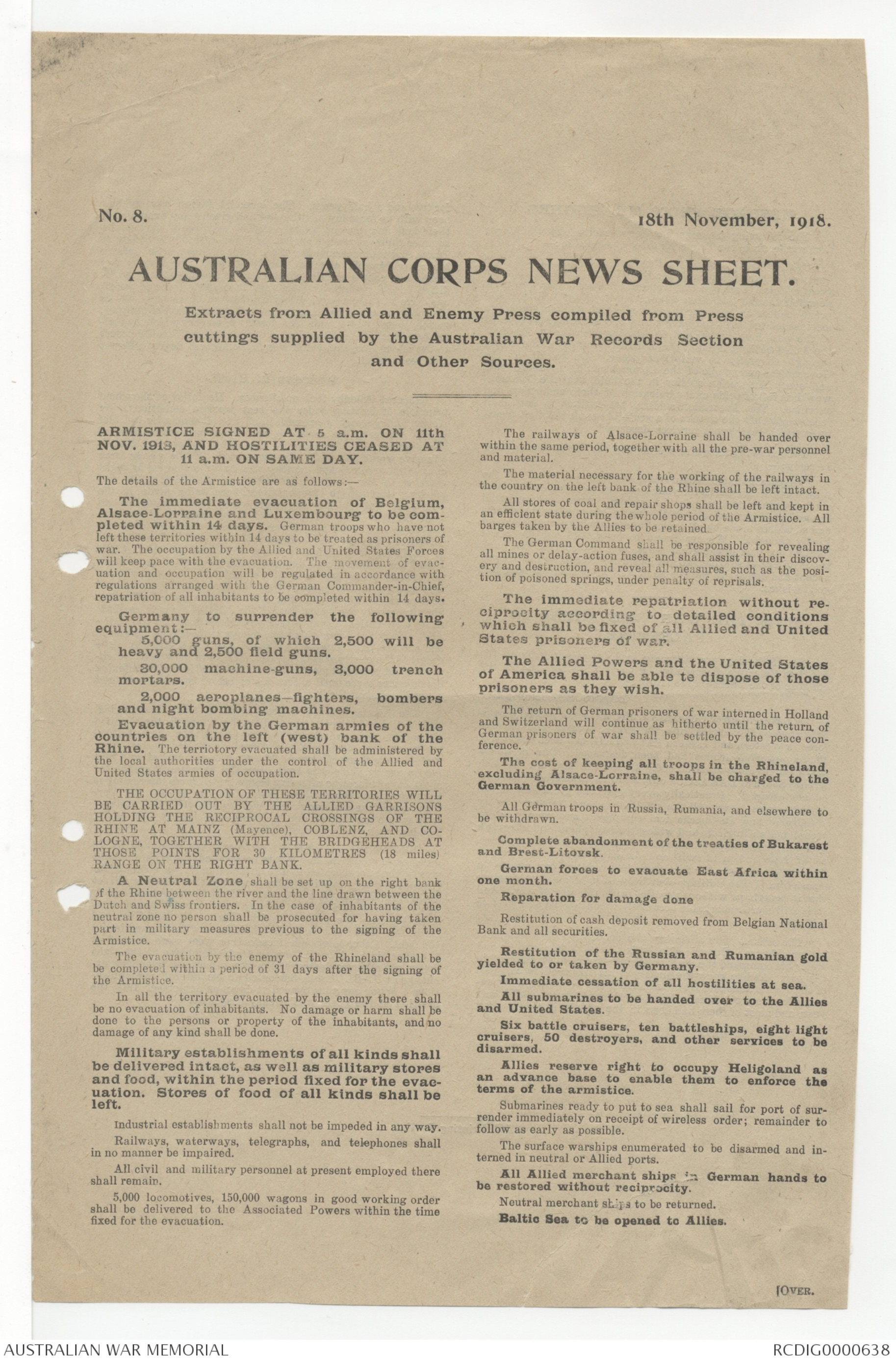
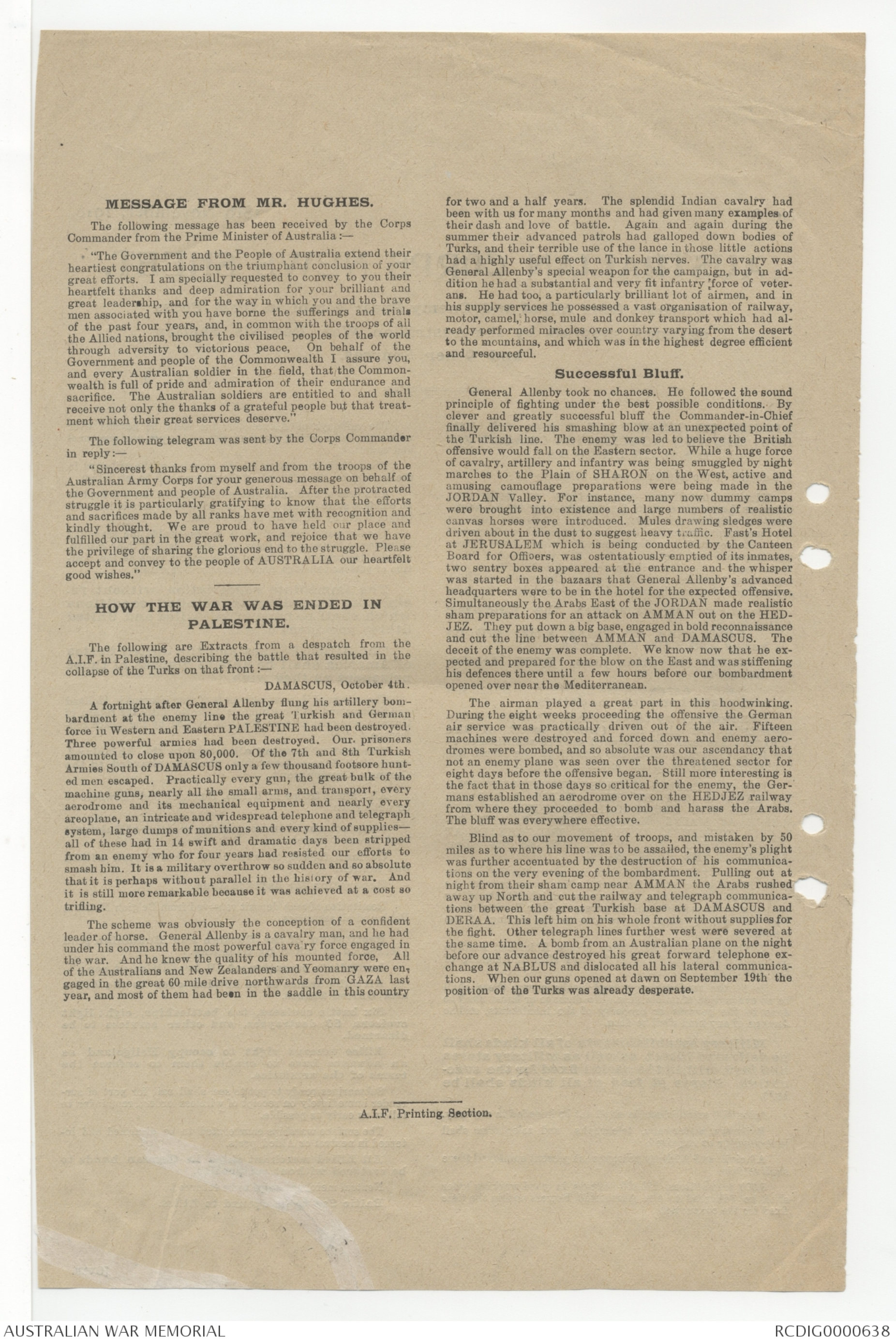
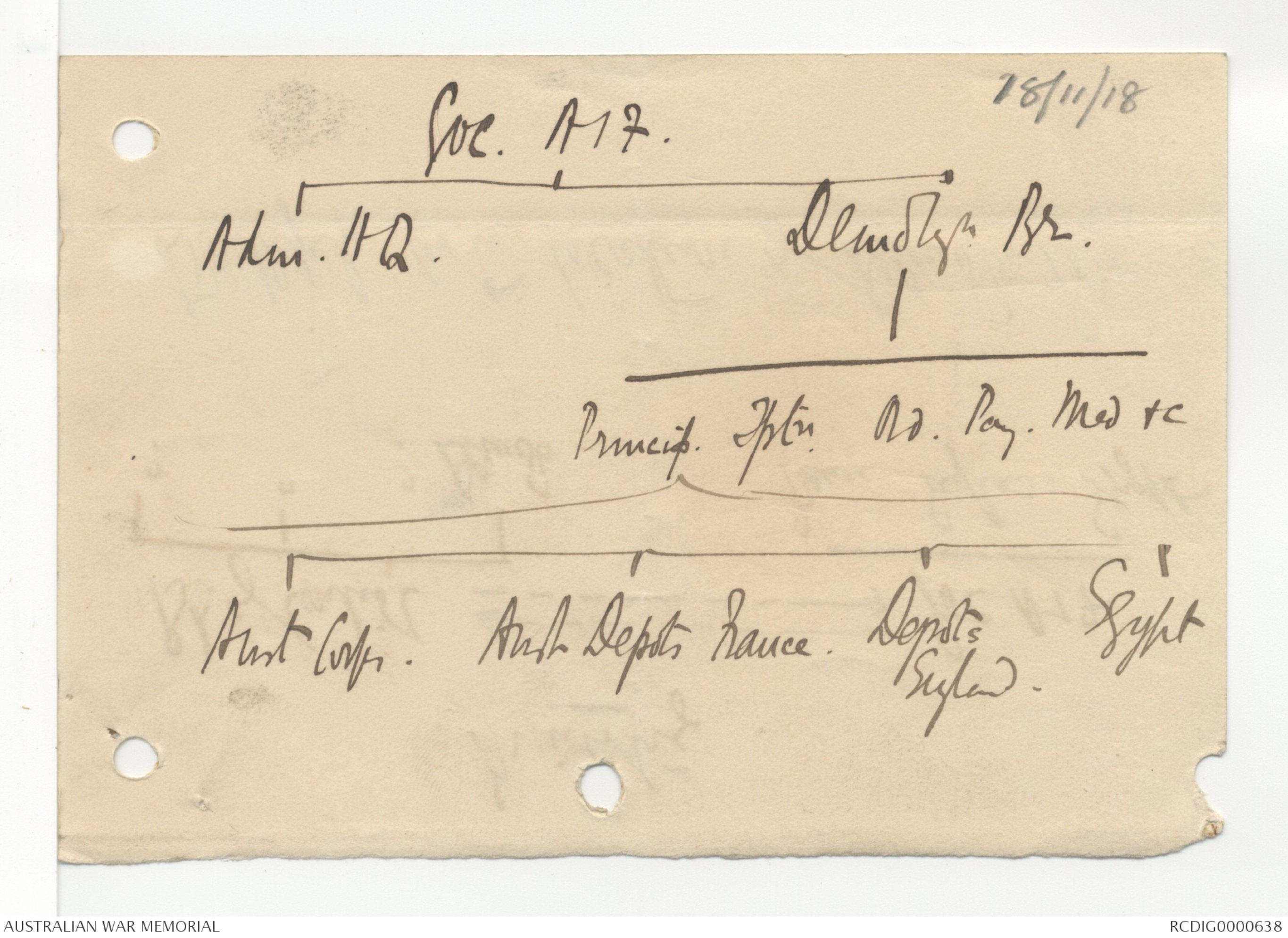
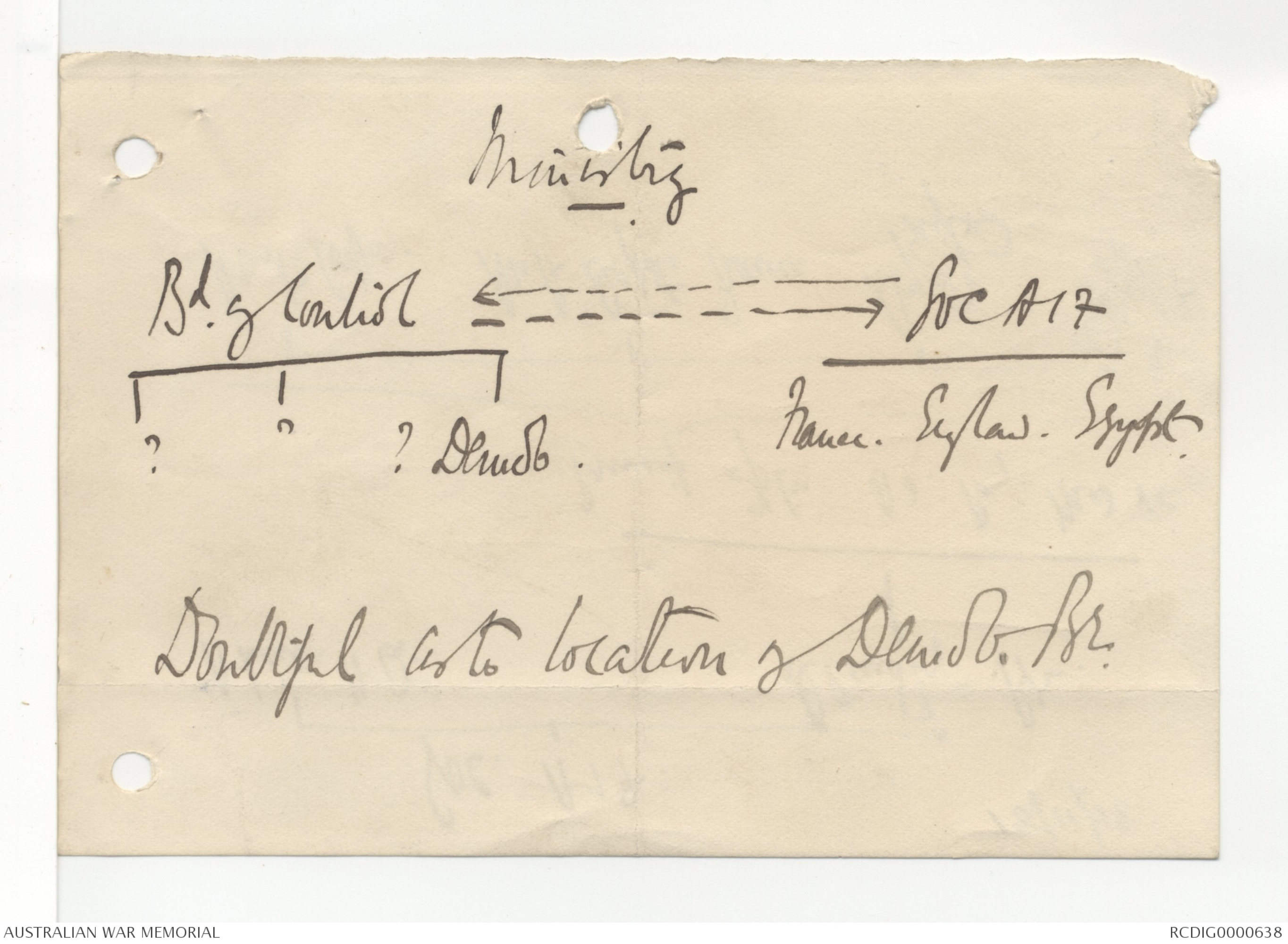
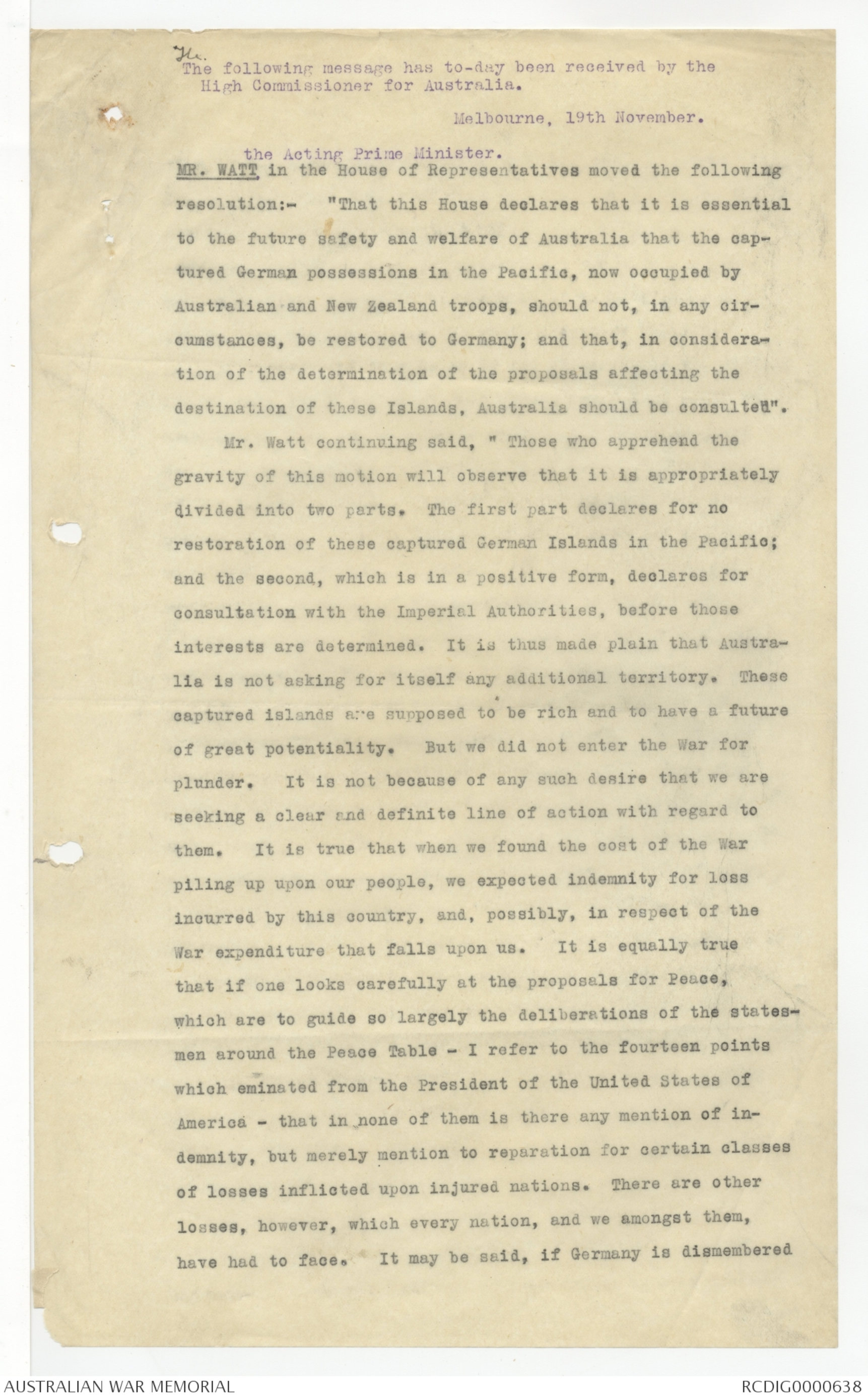
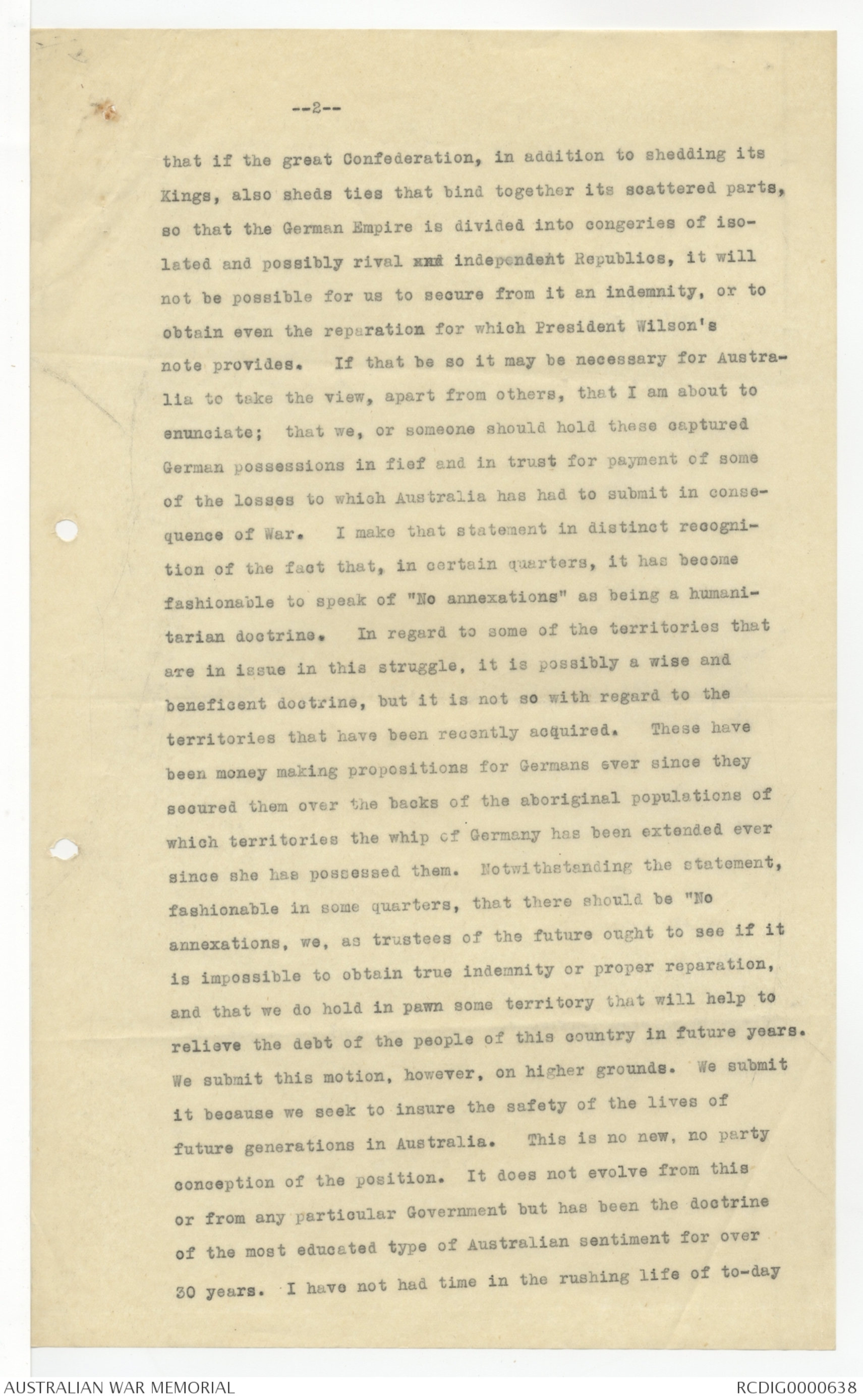
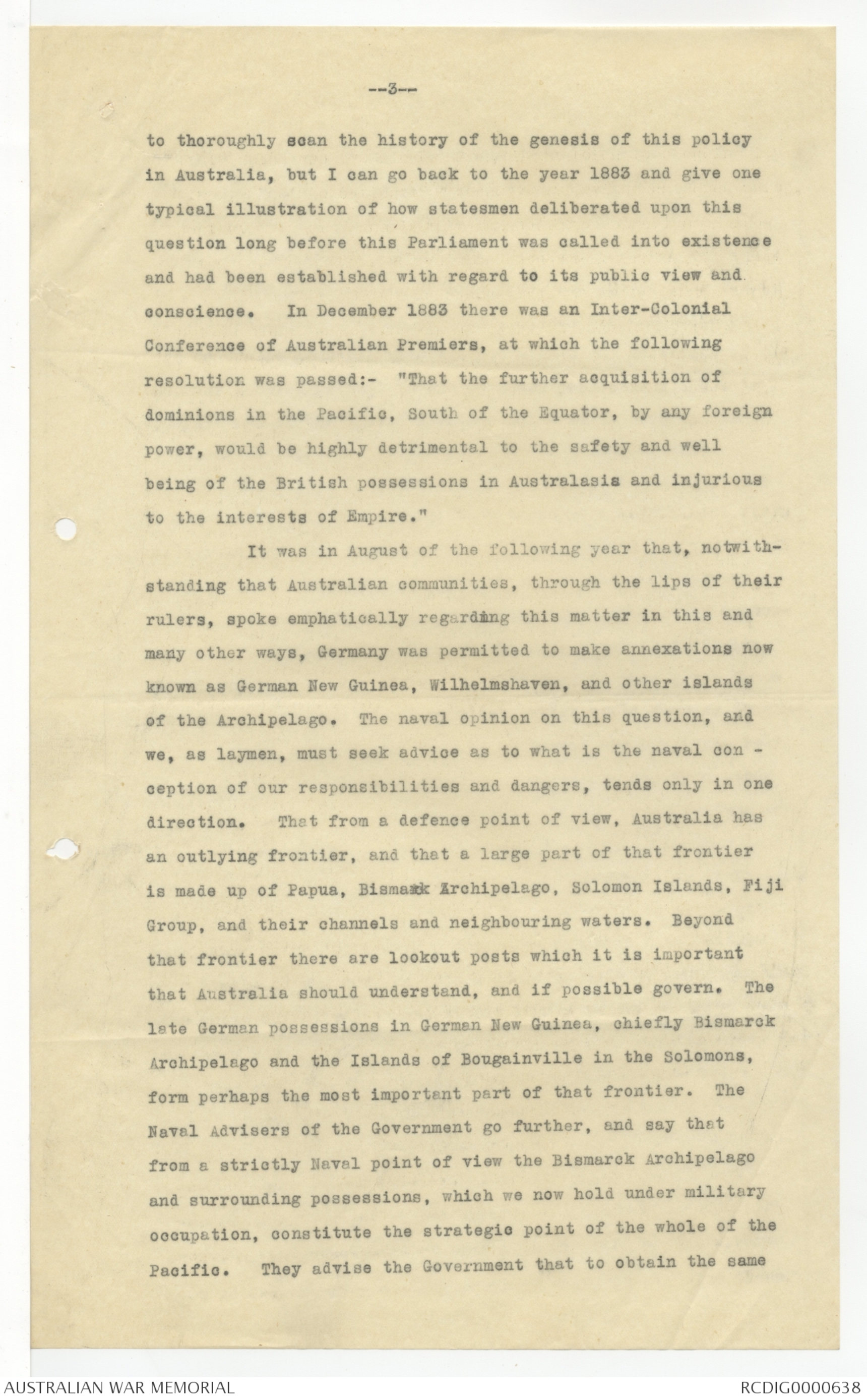
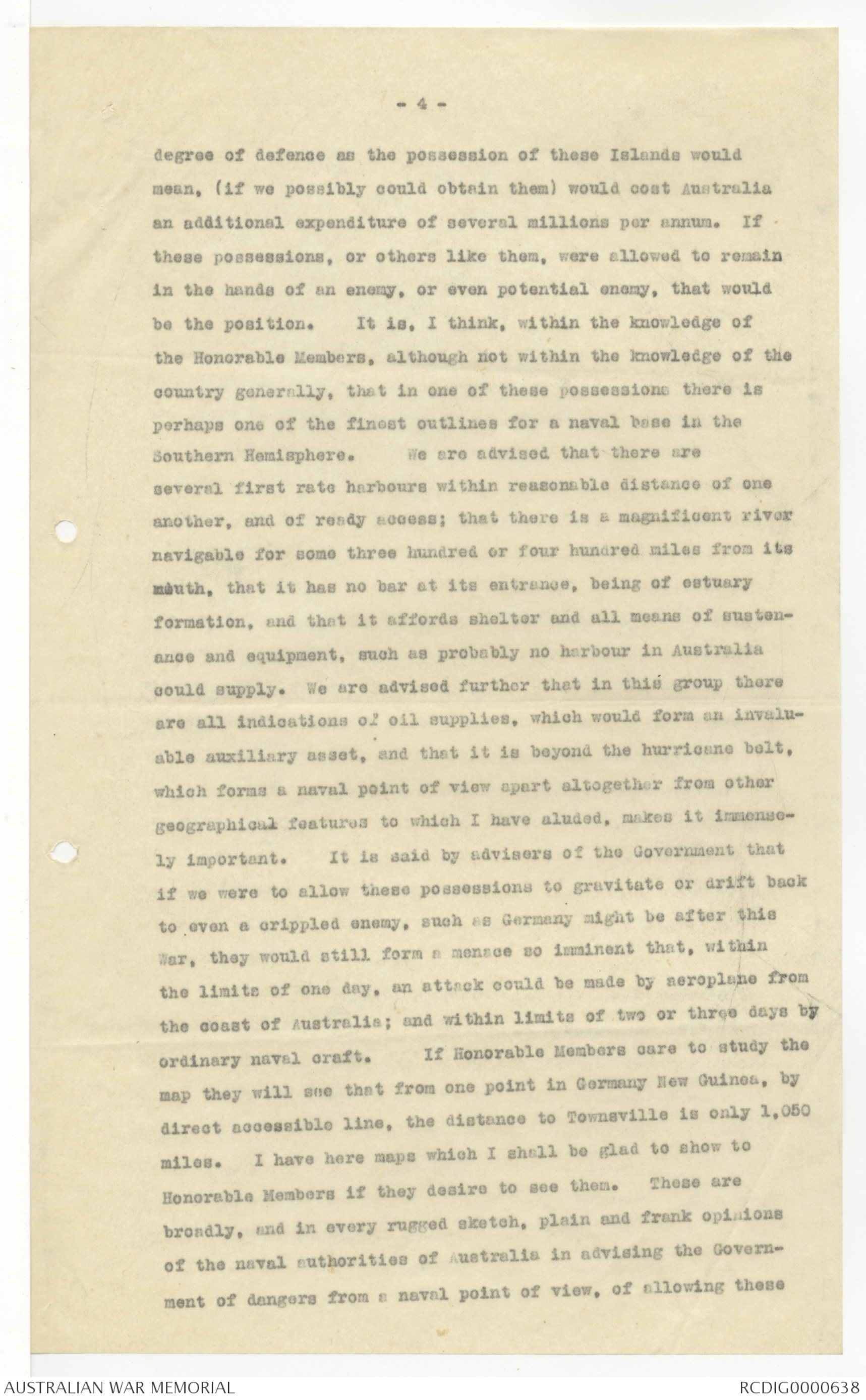
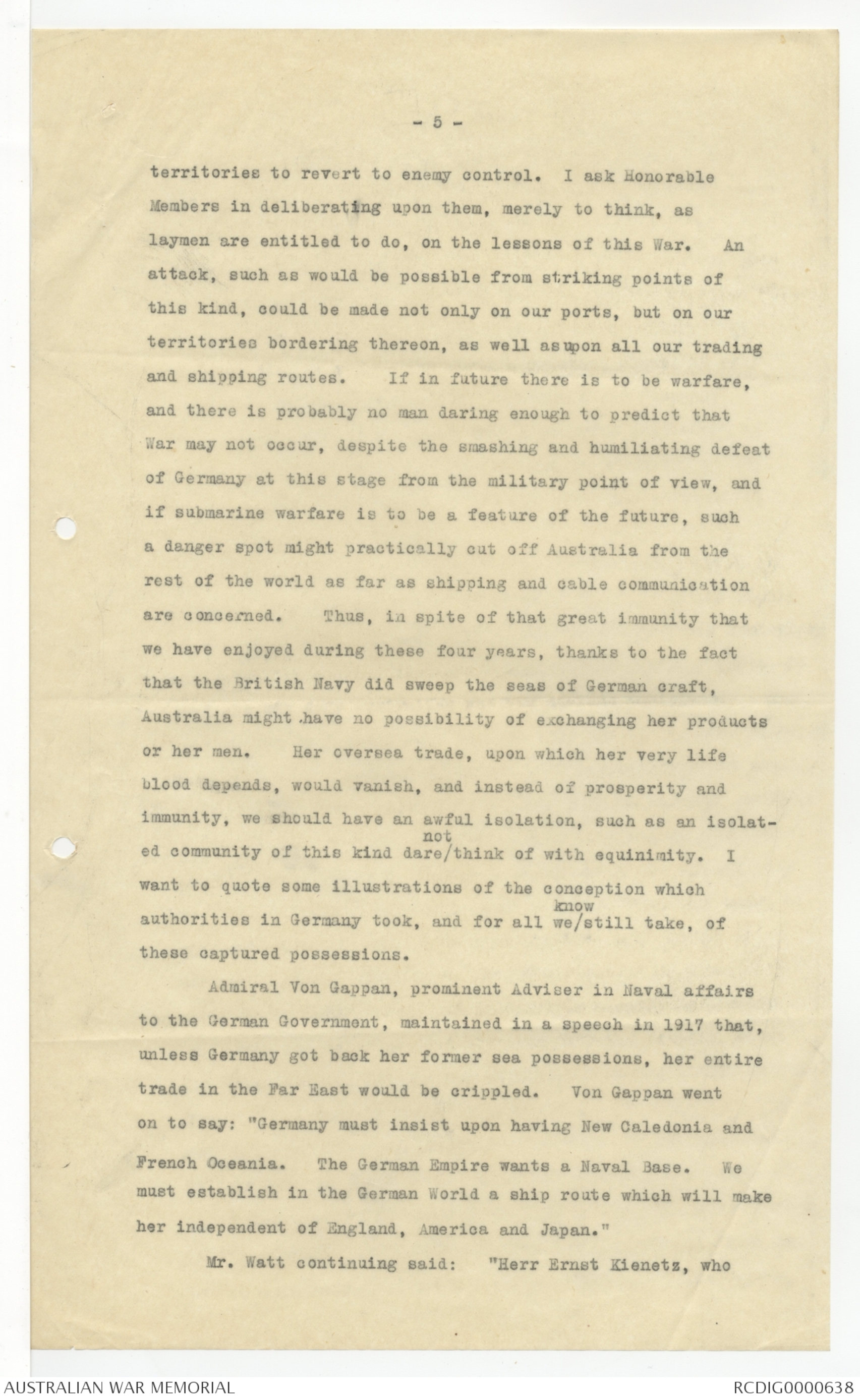
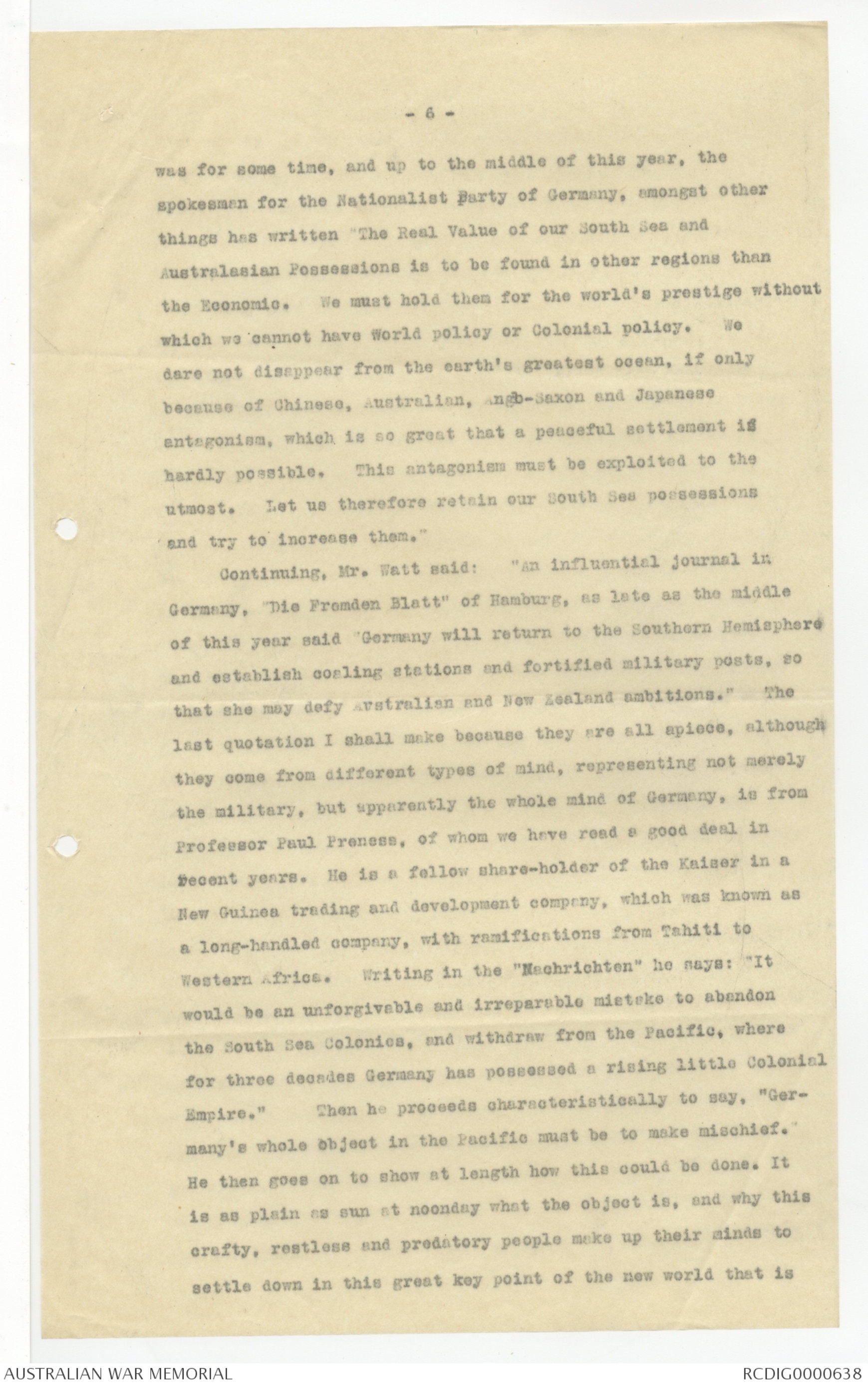
No. 8.
18th November, 1918.
AUSTRALIAN CORPS NEWS SHEET.
Extracts from Allied and Enemy Press compiled from Press
cuttings supplied by the Australian War Records Section
and Other Sources.
ARMISTICE SIGNED AT 5 a.m. ON 11th
NOV. 1918, AND HOSTILITIES CEASED AT
11 am. ON SAME DAY.
The details of the Armistice are as follows:-
The immediate evacuation of Belgium,
Alsace-Lorraine and Luxembourg to be completed
within 14 days. German troops who have not
left these territories within 14 days to be treated as prisoners of
war. The occupation by the Allied and United States Forces
will keep pace with the evacuation. The movement of evacuation
and occupation will be regulated in accordance with
regulations arranged with the German Commander-in-Chief,
repatriation of all inhabitants to be completed within 14 days.
Germany to surrender, the following
equipment:-
5,000 guns, of which 2,500 will be
heavy and 2,500 field guns.
30,000 machine-guns, 3000 trench
mortars.
2,000 aeroplanes-fighters, bombers
and night bombing machines.
Evacuation by the German armies of the
countries on the left (west) bank of the
Rhine. The territory evacuated shall be administered by
the local authorities under the control of the Allied and
United States armies of occupation.
THE OCCUPATION OF THESE TERRITORIES WILL
BE CARRIED OUT BY THE ALLIED GARRISONS
HOLDING THE RECIPROCAL CROSSINGS OF THE
RHINE AT MAINZ (Mayence), COBLENZ, AND COLOGNE,
TOGETHER WITH THE BRIDGEHEADS AT
THOSE POINTS FOR 30 KILOMETRES (18 miles)
RANGE ON THE RIGHT BANK.
A Neutral Zone shall be set up on the right bank
of the Rhine between the river and the line drawn between the
Dutch and Swiss frontiers. In the case of inhabitants of the
neutral zone no person shall be prosecuted for having taken
part in military measures previous to the signing of the
Armistice.
The evacuation by the enemy of the Rhineland shall be
be completed within a period of 31 days after the signing of
the Armistice.
In all the territory evacuated by the enemy there shall
be no evacuation of inhabitants. No damage or harm shall be
done to the persons or property of the inhabitants, and no
damage of any kind shall be done.
Military establishments of all kinds shall
be delivered intact, as well as military stores
and food, within the period fixed for the evacuation.
Stores of food of all kinds shall be
left.
Industrial establishments shall not be impeded in any way.
Railways, waterways, telegraphs, and telephones shall
in no manner be impaired.
All civil and military personnel at present employed there
shall remain.
5,000 locomotives, 150,000 wagons in good working order
shall be delivered to the Associated Powers within the time
fixed for the evacuation.
The railways of Alsace-Lorraine shall be handed over
within the same period, together with all the pre-war personnel
and material.
The material necessary for the working of the railways in
the country on the left bank of the Rhine shall be left intact.
All stores of coal and repair shops shall be left and kept in
an efficient state during the whole period of the Armistice. All
barges taken by the Allies to be retained.
The German Command shall be responsible for revealing
all mines or delay-action fuses, and shall assist in their discovery
and destruction, and reveal all measures, such as the position
of poisoned springs, under penalty of reprisals.
The immediate repatriation without reciprocity
according to detailed conditions
which shall be fixed of all Allied and United
States prisoners of war.
The Allied Powers and the United States
of America shall be able to dispose of those
prisoners as they wish.
The return of German prisoners of war interned in Holland
and Switzerland will continue as hitherto until the return of
German prisoners of war shall be settled by the peace conference.
The cost of keeping all troops in the Rhineland,
excluding Alsace-Lorraine, shall be charged to the
German Government.
All German troops in Russia, Rumania, and elsewhere to
be withdrawn.
Complete abandonment of the treaties of Bukarest
and Brest-Litovsk.
German forces to evacuate East Africa within
one month.
Reparation for damage done
Restitution of cash deposit removed from Belgian National
Bank and all securities.
Restitution of the Russian and Rumanian gold
yielded to or taken by Germany.
Immediate cessation of all hostilities at sea.
All submarines to be handed over to the Allies
and United States.
Six battle cruisers, ten battleships, eight light
cruisers, 50 destroyers, and other services to be
disarmed.
Allies reserve right to occupy Heligoland as
an advance base to enable them to enforce the
terms of the armistice.
Submarines ready to put to sea shall sail for port of surrender
immediately on receipt of wireless order; remainder to
follow as early as possible.
The surface warships enumerated to be disarmed and interned
in neutral or Allied ports.
All Allied merchant ships in German hands to
be restored without reciprocity.
Neutral merchant ships to be returned.
Baltic Sea to be opened to Allies.
[OVER.
MESSAGE FROM MR. HUGHES.
The following message has been received by the Corps
Commander from the Prime Minister of Australia:-
"The Government and the People of Australia extend their
heartiest congratulations on the triumphant conclusion of your
great efforts. I am specially requested to convey to you their
heartfelt thanks and deep admiration for your brilliant and
great leadership, and for the way in which you and the brave
men associated with you have borne the sufferings and trials
of the past four years, and, in common with the troops of all
the Allied nations, brought the civilised peoples of the world
through adversity to victorious peace. On behalf of the
Government and people of the Commonwealth I assure you,
and every Australian soldier in the field, that the Commonwealth
is full of pride and admiration of their endurance and
sacrifice. The Australian soldiers are entitled to and shall
receive not only the thanks of a grateful people but that treatment
which their great services deserve."
The following telegram was sent by the Corps Commander
in reply:-
"Sincerest thanks from myself and from the troops of the
Australian Army Corps for your generous message on behalf of
the Government and people of Australia. After the protracted
struggle it is particularly gratifying to know that the efforts
and sacrifices made by all ranks have met with recognition and
kindly thought. We are proud to have held our place and
fulfilled our part in the great work, and rejoice that we have
the privilege of sharing the glorious end to the struggle. Please
accept and convey to the people of AUSTRALIA our heartfelt
good wishes."
HOW THE WAR WAS ENDED IN
PALESTINE.
The following are Extracts from a despatch from the
A.I.F. in Palestine, describing the battle that resulted in the
collapse of the Turks on that front:-
DAMASCUS, October 4th.
A fortnight after General Allenby flung his artillery bombardment
at the enemy line the great Turkish and German
force in Western and Eastern PALESTINE had been destroyed.
Three powerful armies had been destroyed. Our prisoners
amounted to close upon 80,000. Of the 7th and 8th Turkish
Armies South of DAMASCUS only a few thousand footsore hunted
men escaped. Practically every gun, the great bulk of the
machine guns, nearly all the small arms, and transport, every
aerodrome and its mechanical equipment and nearly every
aeroplane, an intricate and widespread telephone and telegraph
system, large dumps of munitions and every kind of supplies–
all of these had in 14 swift and dramatic days been stripped
from an enemy who for four years had resisted our efforts to
smash him. It is a military overthrow so sudden and so absolute
that it is perhaps without parallel in the history of war. And
it is still more remarkable because it was achieved at a cost so
trifling.
The scheme was obviously the conception of a confident
leader of horse. General Allenby is a cavalry man, and he had
under his command the most powerful cavalry force engaged in
the war. And he knew the quality of his mounted force, All
of the Australians and New Zealanders and Yeomanry were engaged
in the great 60 mile drive northwards from GAZA last
year, and most of them had been in the saddle in this country
for two and a half years. The splendid Indian cavalry had
been with us for many months and had given many examples of
their dash and love of battle. Again and again during the
summer their advanced patrols had galloped down bodies of
Turks, and their terrible use of the lance in those little actions
had a highly useful effect on Turkish nerves. The cavalry was
General Allenby's special weapon for the campaign, but in addition
he had a substantial and very fit infantry force of veterans.
He had too, a particularly brilliant lot of airmen, and in
his supply services he possessed a vast organisation of railway,
motor, camel, horse, mule and donkey transport which had already
performed miracles over country varying from the desert
to the mountains, and which was in the highest degree efficient
and resourceful.
Successful Bluff.
General Allenby took no chances. He followed the sound
principle of fighting under the best possible conditions. By
clever and greatly successful bluff the Commander-in-Chief
finally delivered his smashing blow at an unexpected point of
the Turkish line. The enemy was led to believe the British
offensive would fall on the Eastern sector. While a huge force
of cavalry, artillery and infantry was being smuggled by night
marches to the Plain of SHARON on the West, active and
amusing camouflage preparations were being made in the
JORDAN Valley. For instance, many now dummy camps
were brought into existence and large numbers of realistic
canvas horses were introduced. Mules drawing sledges were
driven about in the dust to suggest heavy traffic. Fast's Hotel
at JERUSALEM which is being conducted by the Canteen
Board for Officers, was ostentatiously emptied of its inmates,
two sentry boxes appeared at the entrance and the whisper
was started in the bazaars that General Allenby's advanced
headquarters were to be in the hotel for the expected offensive.
Simultaneously the Arabs East of the JORDAN made realistic
sham preparations for an attack on AMMAN out on the HEDJEZ.
They put down a big base, engaged in bold reconnaissance
and cut the line between AMMAN and DAMASCUS. The
deceit of the enemy was complete. We know now that he expected
and prepared for the blow on the East and was stiffening
his defences there until a few hours before our bombardment
opened over near the Mediterranean.
The airman played a great part in this hoodwinking.
During the eight weeks proceeding the offensive the German
air service was practically driven out of the air. Fifteen
machines were destroyed and forced down and enemy aerodromes
were bombed, and so absolute was our ascendancy that
not an enemy plane was seen over the threatened sector for
eight days before the offensive began. Still more interesting is
the fact that in those days so critical for the enemy, the Germans
established an aerodrome over on the HEDJEZ railway
from where they proceeded to bomb and harass the Arabs.
The bluff was everywhere effective.
Blind as to our movement of troops, and mistaken by 50
miles as to where his line was to be assailed, the enemy's plight
was further accentuated by the destruction of his communications
on the very evening of the bombardment. Pulling out at
night from their sham camp near AMMAN the Arabs rushed
away up North and cut the railway and telegraph communications
between the great Turkish base at DAMASCUS and
DERAA. This left him on his whole front without supplies for
the night. Other telegraph lines further west were severed at
the same time. A bomb from an Australian plane on the night
before our advance destroyed his great forward telephone exchange
at NABLUS and dislocated all his lateral communications.
When our guns opened at dawn on September 19th the
position of the Turks was already desperate.
A.I.F. Printing Section.
18/11/18
Organisational chart - see original document
GoC AIF.
Ministry
Organisational chart - see original document
[*The.*]
The following message has to-day been received by the
High Commissioner for Australia.
Melbourne, 19th November.
the Acting Prime Minister.
MR. WATT in the House of Representatives moved the following
resolution:- "That this House declares that it is essential
to the future safety and welfare of Australia that the captured
German possessions in the Pacific, now occupied by
Australian and New Zealand troops, should not, in any circumstances,
be restored to Germany; and that, in consideration
of the determination of the proposals affecting the
destination of these Islands, Australia should be consulted".
Mr. Watt continuing said, " Those who apprehend the
gravity of this motion will observe that it is appropriately
divided into two parts. The first part declares for no
restoration of these captured German Islands in the Pacific;
and the second, which is in a positive form, declares for
consultation with the Imperial Authorities, before those
interests are determined. It is thus made plain that Australia
is not asking for itself any additional territory. These
captured islands are supposed to be rich and to have a future
of great potentiality. But we did not enter the War for
plunder. It is not because of any such desire that we are
seeking a clear and definite line of action with regard to
them. It is true that when we found the cost of the War
piling up upon our people, we expected indemnity for loss
incurred by this country, and, possibly, in respect of the
War expenditure that falls upon us. It is equally true
that if one looks carefully at the proposals for Peace,
which are to guide so largely the deliberations of the statesmen
around the Peace Table - I refer to the fourteen points
which eminated from the President of the United States of
America - that in none of them is there any mention of indemnity,
but merely mention to reparation for certain classes
of losses inflicted upon injured nations. There are other
losses, however, which every nation, and we amongst them,
have had to face. It may be said, if Germany is dismembered
--2--
that if the great Confederation, in addition to shedding its
Kings, also sheds ties that bind together its scattered parts,
so that the German Empire is divided into congeries of isolated
and possibly rival and independent Republics, it will
not be possible for us to secure from it an indemnity, or to
obtain even the reparation for which President Wilson's
note provides. If that be so it may be necessary for Australia
to take the view, apart from others, that I am about to
enunciate; that we, or someone should hold these captured
German possessions in fief and in trust for payment of some
of the losses to which Australia has had to submit in consequence
of War. I make that statement in distinct recognition
of the fact that, in certain quarters, it has become
fashionable to speak of "No annexations" as being a humanitarian
doctrine. In regard to some of the territories that
are in issue in this struggle, it is possibly a wise and
beneficent doctrine, but it is not so with regard to the
territories that have been recently acquired. These have
been money making propositions for Germans ever since they
secured them over the backs of the aboriginal populations of
which territories the whip of Germany has been extended ever
since she has possessed them. Notwithstanding the statement,
fashionable in some quarters, that there should be "No
annexations, we, as trustees of the future ought to see if it
is impossible to obtain true indemnity or proper reparation,
and that we do hold in pawn some territory that will help to
relieve the debt of the people of this country in future years.
We submit this motion, however, on higher grounds. We submit
it because we seek to insure the safety of the lives of
future generations in Australia. This is no new, no party
conception of the position. It does not evolve from this
or from any particular Government but has been the doctrine
of the most educated type of Australian sentiment for over
30 years. I have not had time in the rushing life of to-day
--3--
to thoroughly scan the history of the genesis of this policy
in Australia, but I can go back to the year 1883 and give one
typical illustration of how statesmen deliberated upon this
question long before this Parliament was called into existence
and had been established with regard to its public view and
conscience. In December 1883 there was an Inter-Colonial
Conference of Australian Premiers, at which the following
resolution was passed:- "That the further acquisition of
dominions in the Pacific, South of the Equator, by any foreign
power, would be highly detrimental to the safety and well
being of the British possessions in Australasia and injurious
to the interests of Empire."
It was in August of the following year that, notwithstanding
that Australian communities, through the lips of their
rulers, spoke emphatically regarding this matter in this and
many other ways, Germany was permitted to make annexations now
known as German New Guinea, Wilhelmshaven, and other islands
of the Archipelago. The naval opinion on this question, and
we, as laymen, must seek advice as to what is the naval conception
of our responsibilities and dangers, tends only in one
direction. That from a defence point of view, Australia has
an outlying frontier, and that a large part of that frontier
is made up of Papua, Bismark Archipelago, Solomon Islands, Fiji
Group, and their channels and neighbouring waters. Beyond
that frontier there are lookout posts which it is important
that Australia should understand, and if possible govern. The
late German possessions in German New Guinea, chiefly Bismarck
Archipelago and the Islands of Bougainville in the Solomons,
form perhaps the most important part of that frontier. The
Naval Advisers of the Government go further, and say that
from a strictly Naval point of view the Bismarck Archipelago
and surrounding possessions, which we now hold under military
occupation, constitute the strategic point of the whole of the
Pacific. They advise the Government that to obtain the same
-4-
degree of defence as the possession of these Islands would
mean, (if we possibly could obtain them) would cost Australia
an additional expenditure of several millions per annum. If
these possessions, or others like them, were allowed to remain
in the hands of an enemy, or even potential enemy, that would
be the position. It is. I think, within the knowledge of
the Honorable Members, although not within the knowledge of the
country generally, that in one of these possessions there is
perhaps one of the finest outlines for a naval base in the
Southern Hemisphere. We are advised that there are
several first rate harbours within reasonable distance of one
another, and of ready access; that there is a magnificent river
navigable for some three hundred or four hundred miles from its
mouth, that it has no bar at its entrance, being of estuary
formation, and that it affords shelter and all means of sustenance
and equipment, such as probably no harbour in Australia
could supply. We are advised further that in this group there
are all indications of oil supplies, which would form an invaluable
auxiliary asset, and that it is beyond the hurricane belt,
which forms a naval point of view apart altogether from other
geographical features to which I have aluded, makes it immensely
important. It is said by advisers of the Government that
if we were to allow these possessions to gravitate or drift back
to even a crippled enemy, such as Germany might be after this
War, they would still form a menace so imminent that, within
the limits of one day, an attack could be made by aeroplane from
the coast of Australia; and within limits of two or three days by
ordinary naval craft. If Honorable Members care to study the
map they will see that from one point in Germany New Guinea, by
direct accessible line, the distance to Townsville is only 1,050
miles. I have here maps which I shall be glad to show to
Honorable Members if they desire to see them. These are
broadly, and in every rugged sketch, plain and frank opinions
of the naval authorities of Australia in advising the Government
of dangers from a naval point of view, of allowing these
- 5 -
territories to revert to enemy control. I ask Honorable
Members in deliberating upon them, merely to think, as
laymen are entitled to do, on the lessons of this War. An
attack, such as would be possible from striking points of
this kind, could be made not only on our ports, but on our
territories bordering thereon, as well as upon all our trading
and shipping routes. If in future there is to be warfare,
and there is probably no man daring enough to predict that
War may not occur, despite the smashing and humiliating defeat
of Germany at this stage from the military point of view, and
if submarine warfare is to be a feature of the future, such
a danger spot might practically cut off Australia from the
rest of the world as far as shipping and cable communication
are concerned. Thus, in spite of that great immunity that
we have enjoyed during these four years, thanks to the fact
that the British Navy did sweep the seas of German craft,
Australia might have no possibility of exchanging her products
or her men. Her oversea trade, upon which her very life
blood depends, would vanish, and instead of prosperity and
immunity, we should have an awful isolation, such as an isolated
community of this kind dare∧not think of with equinimity. I
want to quote some illustrations of the conception which
authorities in Germany took, and for all we ^know still take, of
these captured possessions.
Admiral Von Gappan, prominent Adviser in Naval affairs
to the German Government, maintained in a speech in 1917 that,
unless Germany got back her former sea possessions, her entire
trade in the Far East would be crippled. Von Gappan went
on to say: "Germany must insist upon having New Caledonia and
French Oceania. The German Empire wants a Naval Base. We
must establish in the German World a ship route which will make
her independent of England, America and Japan."
Mr. Watt continuing said: "Herr Ernst Kienetz, who
-6-
was for some time, and up to the middle of this year, the
spokesman for the Nationalist Party of Germany, amongst other
things has written "The Real Value of our South Sea and
Australasian Possessions is to be found in other regions than
the Economic. We must hold them for the world's prestige without
which we cannot have World policy or Colonial policy. We
dare not disappear from the earth's greatest ocean, if only
because of Chinese, Australian, Anglo-Saxon and Japanese
antagonism, which is so great that a peaceful settlement is
hardly possible. This antagonism must be exploited to the
utmost. Let us therefore retain our South Sea possessions
and try to increase them."
Continuing, Mr. Watt said: "An influential journal in
Germany. "Die Fromden Blatt" of Hamburg, as late as the middle
of this year said "Germany will return to the Southern Hemisphere
and establish coaling stations and fortified military posts, so
that she may defy Australian and New Zealand ambitions." The
last quotation I shall make because they are all apiece, although
they come from different types of mind, representing not merely
the military, but apparently the whole mind of Germany, is from
Professor Paul Preness, of whom we have read a good deal in
recent years. He is a fellow share-holder of the Kaiser in a
New Guinea trading and development company, which was known as
a long-handled company, with ramifications from Tahiti to
Western Africa. Writing in the "Nachrichten" he says: "It
would be an unforgivable and irreparable mistake to abandon
the South Sea Colonies, and withdraw from the Pacific, where
for three decades Germany has possessed a rising little Colonial
Empire." Then he proceeds characteristically to say, "Germany's
whole object in the Pacific must be to make mischief.
He then goes on to show at length how this could be done. It
is as plain as sun at noonday what the object is, and why this
crafty, restless and predatory people make up their minds to
settle down in this great key point of the new world that is
 Beverley Pagano
Beverley PaganoThis transcription item is now locked to you for editing. To release the lock either Save your changes or Cancel.
This lock will be automatically released after 60 minutes of inactivity.